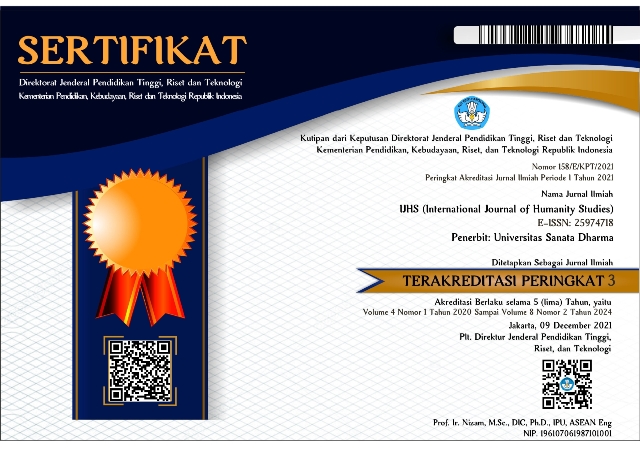LITERARY TEXT CONVERSION AS A FORM OF WRITING LITERACY ACTIVITIES
(1) Musi Charitas Caholic University
(*) Corresponding Author
Abstract
Keywords
Full Text:
PDFReferences
Derewianka, B. (2003). Trends and issues in genre-based approaches. RELC Journal, 133-154.
Hudayat, A. Y. (2007). Modul metode penelitian sastra. Database Universitas Padjajaran Bandung. www.resoouces-unpad.ac.id., diunduh pada 7 September 2010.
Iswanto. (2003). Penelitian sastra dalam perspektif strukturalisme genetik. Metodologi penelitian sastra. Yogyakarta: Hanindita Graha Widya.
Kharizmi, M. (2015). Kesulitan peserta didik sekolah dasar dalam meningkatkan kemampuan literasi. JUPENDAS, 11-21.
Musfiroh, Tadkiroatun, & Beniati, L. (2016). Konstruk kompetensi literasi untuk peserta didik sekolah dasar. Litera, 15(1).
Mahsun. (2014). Teks dalam pembelajaran bahasa Indonesia; Kurikulum 2013. Jakarta: Rajawali Pers.
Teeuw, A. (1988). Sastra dan ilmu sastra, pengantar teori sastra. Jakarta: Pustaka Jaya
Sylado, R. (2014). Perempuan bernama Arjuna: Sinologi dalam fiksi. Bandung: Nuansa Cendikia.
Sylado, R. (2015). Perempuan bernama Arjuna: Javanologi dalam fiksi. Bandung: Nuansa Cendikia.
Triwidayati, K. R. (2011). Strukturalisme genetik bilangan fu karya Ayu Utami. Hasil Penelitian. Palembang: Program Pascasarjana Universitas Sriwijaya.
Triwidayati, K. R. (2018). Kajian strukturalisme genetik pada novel perempuan bernama Arjuna karya Remy Sylado. Hasil penelitian. Palembang: Universitas Katolik Musi Charitas.
DOI: https://doi.org/10.24071/ijhs.v2i2.1801
Refbacks
- There are currently no refbacks.
Copyright (c) 2019 Katarina Retno Triwidayati
Indexed and abstracted in:
IJHS Sinta 3 Certificate (S3 = Level 3)
International Journal of Humanity Studies (IJHS) has been nationally accredited Sinta 2 by the Ministry of Higher Education, Science, and Technology of the Republic of Indonesia based on the decree No. Surat Keputusan 0173/C3/DT.05.00/2025. Validity for 5 years: Vol. 7 No. 2, 2024 till Vol. 12 No. 1, 2029.

This work is licensed under CC BY-SA.
Creative Commons Attribution-ShareAlike 4.0 International License.
p-ISSN: 2597-470X (since 31 August 2017); e-ISSN: 2597-4718 (since 31 August 2017)
Notice: The opinions expressed in this publication are those of the authors. They do not purport to reflect the opinions or views of the editorial team or publishers.
International Journal of Humanity Studies (IJHS) is a scientific journal in English published twice a year, namely in September and March, by Sanata Dharma University, Yogyakarta, Indonesia.




















